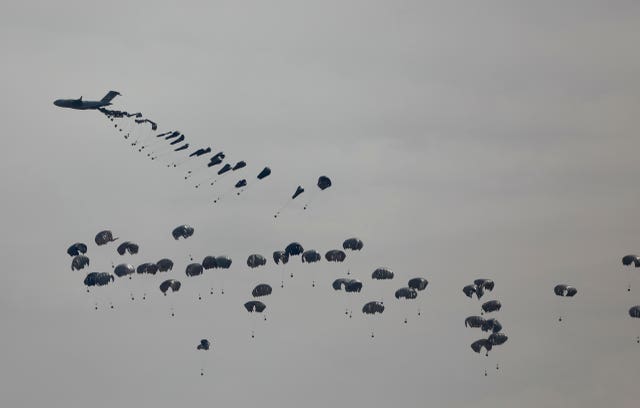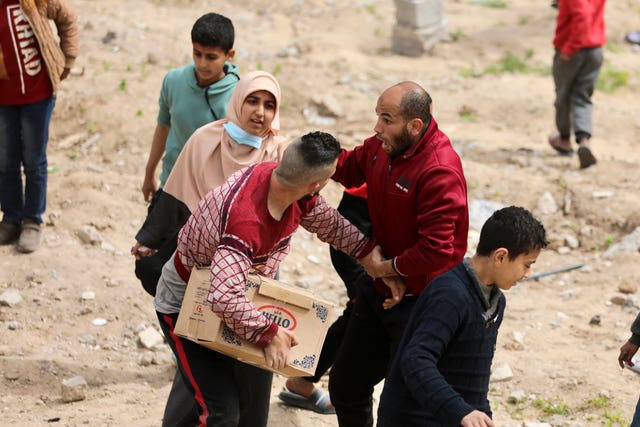US President Joe Biden and his Israeli counterpart Benjamin Netanyahu have held a call as the divide grows between allies over the food crisis in Gaza and the conduct of war, White House sources said.
It came amid a report warning that “famine is imminent” in northern Gaza, where an estimated 70% of the population faces catastrophic hunger.
The report came from the Integrated Food Security Phase Classification, a partnership of more than a dozen governments, UN aid and other agencies that determines the severity of food crises.
It says virtually everyone in Gaza is struggling to get enough food, and around 210,000 people in northern Gaza are in Phase 5, the highest, which refers to catastrophic hunger.

It warned that if Israel broadens its offensive to the packed southern city of Rafah, the fighting could drive around half of Gaza’s total population of 2.3 million into catastrophic hunger.
In December, the IPC estimated that a quarter of Gaza’s overall population was starving.
Aid groups say they face a burdensome Israeli process to import humanitarian aid, and that distribution in much of Gaza, especially the north, is virtually impossible because of Israeli restrictions, ongoing hostilities and the breakdown of law and order.
Israel says it places no limits on the import of humanitarian aid and blames bottlenecks on the UN agencies distributing it.
The US and other countries have carried out airdrops in recent days and a sea corridor has just opened up. But aid groups say those efforts are costly and inefficient, and are no substitute for Israel opening up more land routes.
It comes as Israeli forces launched another raid on the Gaza Strip’s largest hospital on Monday, saying Hamas militants had regrouped there and had fired on them from inside the site where Palestinian officials say tens of thousands of people have been sheltering.

The military said it killed a Hamas commander who was armed and hiding inside the medical centre, and that one of its own soldiers was killed in the operation.
The army last raided Shifa Hospital in November after claiming that Hamas maintained an elaborate command centre within and beneath the facility.
The military revealed a tunnel leading to some underground rooms, as well as weapons it said were found inside the hospital.
But the evidence fell short of the earlier claims, and critics accused the army of recklessly endangering the lives of civilians.
Later on Monday it emerged that Israel has urged the top UN court to reject the latest request by South Africa for interim orders to prevent starvation in Gaza as part of a case accusing Israel of breaching the Genocide Convention with its military offensive against Hamas.
In a written response published on Monday by the International Court of Justice, Israel said that claims by South Africa in its request filed earlier this month are “wholly unfounded in fact and law, morally repugnant, and represent an abuse both of the Genocide Convention and of the Court itself.”
Israel fervently denies that its military campaign in Gaza amounts to a breach of the Genocide Convention.
It acknowledged in its written response to South Africa’s request that there are “also tragic and agonising civilian casualties in this war. These realities are the painful result of intensive armed hostilities that Israel did not start and did not want.”
Israel also said in its response that it is “doing a great deal to alleviate such suffering in these very challenging circumstances”.
No date has been set for judges to rule on the South African request.
At hearings in January, lawyers for Israel argued that the war in Gaza was a legitimate defence of its people and that it was Hamas militants who were guilty of genocide.
After the hearings, the court ordered Israel in late January to do all it could to prevent death, destruction and any acts of genocide in Gaza, but stopped short of ordering an end to the military offensive triggered by the deadly October 7 incursion into southern Israel by Hamas.
Israel said that South Africa has presented no reason to change that so-called provisional measures order.
The court last month rejected an earlier request by South Africa for more provisional measures to safeguard Rafah, but also stressed that Israel must respect the earlier measures that imposed at a preliminary stage in the landmark genocide case.
The European Union’s top diplomat, Josep Borrell, said on Monday that impending famine in Gaza was “entirely man-made” as “starvation is used as a weapon of war”.
“Trucks are stopped. People are dying, while the land crossings are artificially closed,” he said.
Later on Monday, a top UN aid official for Palestinian areas is calling for an opening of “all roads” into Gaza to help avert the potential famine.
Jamie McGoldrick, the UN humanitarian co-ordinator for the Occupied Palestinian Territory, said that roads from Ashdod in Israel into beleaguered north Gaza, the military road, coast road and middle road into Gaza should be used.
He said Israeli scanners should check trucks in Jordan and elsewhere to expedite deliveries of needed food and other supplies.
“Unless we can put significant supply increases into those areas, those people who are at catastrophic levels of malnutrition or food insecurity will face real serious problems and imminent death,” Mr McGoldrick said by videoconference to reporters in Geneva.
“We have to get all roads open and get all opportunities open for us to actually do more in the current situation.”
He downplayed the prospects that maritime shipments or air drops, carried out by some Western countries, into Gaza could be a substitute for entry by land, saying the only real way to sufficient amounts of food and other supplies “into all parts of Gaza would only be by roads”.




Why are you making commenting on The National only available to subscribers?
We know there are thousands of National readers who want to debate, argue and go back and forth in the comments section of our stories. We’ve got the most informed readers in Scotland, asking each other the big questions about the future of our country.
Unfortunately, though, these important debates are being spoiled by a vocal minority of trolls who aren’t really interested in the issues, try to derail the conversations, register under fake names, and post vile abuse.
So that’s why we’ve decided to make the ability to comment only available to our paying subscribers. That way, all the trolls who post abuse on our website will have to pay if they want to join the debate – and risk a permanent ban from the account that they subscribe with.
The conversation will go back to what it should be about – people who care passionately about the issues, but disagree constructively on what we should do about them. Let’s get that debate started!
Callum Baird, Editor of The National
Comments: Our rules
We want our comments to be a lively and valuable part of our community - a place where readers can debate and engage with the most important local issues. The ability to comment on our stories is a privilege, not a right, however, and that privilege may be withdrawn if it is abused or misused.
Please report any comments that break our rules.
Read the rules hereLast Updated:
Report this comment Cancel